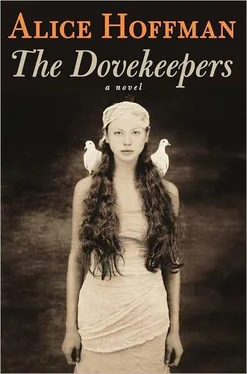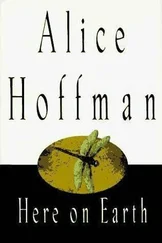Alice Hoffman - The Dovekeepers
Здесь есть возможность читать онлайн «Alice Hoffman - The Dovekeepers» весь текст электронной книги совершенно бесплатно (целиком полную версию без сокращений). В некоторых случаях можно слушать аудио, скачать через торрент в формате fb2 и присутствует краткое содержание. Год выпуска: 2011, ISBN: 2011, Жанр: Историческая проза, на английском языке. Описание произведения, (предисловие) а так же отзывы посетителей доступны на портале библиотеки ЛибКат.
- Название:The Dovekeepers
- Автор:
- Жанр:
- Год:2011
- ISBN:978-1-4516-1749-8
- Рейтинг книги:2.5 / 5. Голосов: 2
-
Избранное:Добавить в избранное
- Отзывы:
-
Ваша оценка:
- 60
- 1
- 2
- 3
- 4
- 5
The Dovekeepers: краткое содержание, описание и аннотация
Предлагаем к чтению аннотацию, описание, краткое содержание или предисловие (зависит от того, что написал сам автор книги «The Dovekeepers»). Если вы не нашли необходимую информацию о книге — напишите в комментариях, мы постараемся отыскать её.
The Dovekeepers — читать онлайн бесплатно полную книгу (весь текст) целиком
Ниже представлен текст книги, разбитый по страницам. Система сохранения места последней прочитанной страницы, позволяет с удобством читать онлайн бесплатно книгу «The Dovekeepers», без необходимости каждый раз заново искать на чём Вы остановились. Поставьте закладку, и сможете в любой момент перейти на страницу, на которой закончили чтение.
Интервал:
Закладка:
At that moment I was unsure whether he would be our murderer or our salvation. The children had stopped in their path, watching with horror. The boys knew their father and called out to him, but he did not answer. Instead he gazed at me, unguarded, and in that moment I saw the man he had been, the one he would be again when he walked into the World-to-Come and bowed before the Creator of all things.
“I leave my children to you,” he said, his voice hoarse. “Wherever they go my wife abides.”
Even now he could not forsake her, or lose her to the beasts who took her down. If he’d been another man, he might have come with us to hide from this mayhem, for I murmured that we were making our escape. But he had been searching for Death for so long he could not linger among us now. He was finally about to meet the one he had been waiting for, his ax ready to take up against Mal’ach ha-Mavet in the only way he could ever win this battle, against himself.
He breathed into his hand, then took my hand in his and told me what I must do.
I ran to those who awaited me. We hurried to the cistern and took the steps as quickly as we could. There was darkness before us, and the echo of the water beneath us. At the mouth to the cave, I paused to tell Revka she must kiss my hand, for this was what the Man from the Valley had commanded of me. When she did, I told her of her son-in-law’s gift to her. Neshamah, the breath of her daughter’s soul, was returned to her, to keep for all eternity and to take with us, wherever we might go.
Our footsteps pounded as we went down into the earth, but only to our ears, for there was no one else left to hear. We could feel the silence of the dead, but it did not follow us. There was only the languid echo of still water, splashing as rocks fell from beneath our footsteps. When we reached the bottom of the well, the white plaster ledge shone and led the way. It seemed that the stars had fallen underground.
We slipped into the water, and that was where we hid from death. We were there on the sixteenth of Nissan, as the day of Passover dawned.
The heat of the fires above us passed over us. As our people were saved when the Angel of Death passed over them when they were slaves in Egypt, so, too, had we eluded him. We slept at the mouth of the well, for we were exhausted and had spent hours in the water, paddling, holding on to the sharp plaster ledge until our fingers bled. We then had pulled ourselves from the cistern so that we might rest alongside the mouth of the well and not drown in our state of exhaustion. There we lay, spent, our hair trailing in the water, our fingers raw, our tunics drenched.
Perhaps we dreamed that those who had died lingered nearby, for they whispered to us in the night. We were so close to the dead we could hear them in the way it is possible to hear wind in a storm even when you are safely hidden away. When we woke, we marveled that we were still living. The black ash had been washed from us during our hours in the cistern, and we could see bands of light streaming from above, for it was morning, and another day had come.
We gazed up in alarm when we heard muffled voices. We thought they were the voices of the dead and perhaps we were among them and hadn’t recognized the World-to-Come, taking it to be the world we had always known before this murderous night had fallen. For all we knew, we, too, were among the dead and had not yet realized we had left our bodies, lingering as the dead often do before they can move on. Fainthearted, we bowed our heads.
Levi and Noah feared that demons awaited us, for they had seen such beings at work. They held each other, readying themselves for whatever terrors would next be inflicted upon them. Yehuda insisted that the End of Days had come, and that his people had arisen from their graves and from the mountain where their bones had been scattered by the jackals, and would soon come to join us. He began to pray, facing in the direction of Jerusalem, for though we were beneath the earth, he could divine the location of that holy city by the placement of the rays of light as the sun rose above the cistern.
Steps clattered down the stairs, down into the earth where we awaited whatever was to come. The noise made me think of the king’s horses, how they had fitted themselves onto the narrowness of the serpents’ path because they had no other choice, how they were blind to the dangers around them.
Four soldiers from the legion came to us, their faces registering shock when they saw us. One grabbed Yehuda and pulled him to his feet. I rose up with a shriek. My hair was the color of blood, and I was flecked with the blood-hued spots that had always marked me and by the bloody slaughter of my people.
The soldier stood back. Perhaps he believed in ghosts.
What are you? he said. He spoke in Latin.
I pretended not to understand.
Are you alive? he asked.
And then we knew we were, for he could see us and he was made of flesh and blood, clothed in the white tunic of the legion, carrying a spear that had been readied to use against us. But the spear had gone slack in his hand, for he knew not what we were, and ghosts could not be killed with weapons made by men.
If circumstances had been different, surely we would have all been slain, but now the soldiers’ expressions were confused, for they were unnerved by what they had witnessed on the mountain above us, the hundreds of charred bodies, the burning of all we had been and all we had owned.
What of all the others? the same soldier said.
I had assumed they had captured more survivors, those who had hidden in their chambers, or had crouched beside the wall.
We have searched everywhere and found nothing but the dead, he went on.
We realized that we were the only ones, and that we alone had the story to tell.
They lined us up and gazed at us, afraid that we were indeed ghosts, and they treated us as such, their respect fashioned from their fear. There was blood on the soles of our feet and on the palms of our hands. One of the soldiers had brought a rope to tie us with, but the one who had spoken to us first slapped the rope away.
Where would they go? he said. How would they escape?
We followed the soldiers, our eyes cast down. The day was chalky and dry, but we were still soaked from our time in the cistern, water streaming from our hair and our sodden tunics. We looked like creatures that had been brought up from the bottom of a river in a net, pale fish who had emerged from the waters of hell.
The stench of charred flesh made us dizzy and faint. Many of the soldiers covered their mouths and noses, many were ashen. Flies were swarming everywhere, and above us there were clouds of ravens and birds of prey. The Romans had been prepared for a battle, never imagining they would have to cross over a field of martyrdom. Nine hundred, burned, slaughtered. Worst were the children and the women and the babies in their mothers’ embrace, their pale, young bodies in clutches of blood, bees circling round as if their remains were sweetened by the honey of their youth. Such deaths were a disgrace to the legion, and the soldiers took no joy in this surrender. Men who feared spirits and ghosts stood on the periphery when we were brought to the plaza. Men who feared their gods imagined that it was a sin for them to walk upon this ground.
I bowed my head before the legion, not to honor them, not as their captive, simply because I could not bring myself to gaze upon the faces of those who had led the battle against us. The children did as I did, and after a moment Revka did so as well, though I knew it was a violation for her to bow before Romans. I hoped she would not judge me. Certainly, I would not judge myself. I left that to the Almighty. We had a reason to go forward and much to protect. We were still in this world, the one we knew, the one we clung to though it was filled with sorrow, the world our fathers had created.
Читать дальшеИнтервал:
Закладка:
Похожие книги на «The Dovekeepers»
Представляем Вашему вниманию похожие книги на «The Dovekeepers» списком для выбора. Мы отобрали схожую по названию и смыслу литературу в надежде предоставить читателям больше вариантов отыскать новые, интересные, ещё непрочитанные произведения.
Обсуждение, отзывы о книге «The Dovekeepers» и просто собственные мнения читателей. Оставьте ваши комментарии, напишите, что Вы думаете о произведении, его смысле или главных героях. Укажите что конкретно понравилось, а что нет, и почему Вы так считаете.












